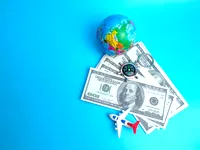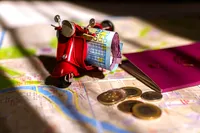Currency in Pakistan
What Currency Does Pakistan Use Now

As you traverse the culturally rich and historically significant landscape of Pakistan, it is important to understand the economic dynamics, starting with the country's currency. Pakistan's official currency is the Pakistani Rupee, represented as PKR. The Pakistani Rupee comes in denominations of 10, 20, 50, 100, 500, 1,000, and 5,000 in the form of paper notes, and coins denominations include 1, 2, and 5 rupees.
Historically, the Pakistani Rupee has been subject to inflation and rapid exchange rate fluctuations. However, it remains the principal unit of exchange for standard transactions in Pakistan. To make it easier for tourists, several foreign currency exchange counters and ATMs are available across the country, ensuring accessible currency exchange at any point during your journey.
Credit and Debit Cards in Pakistan

In an increasingly digitally-focused economic landscape, Pakistan has energetically embraced the trend toward cashless transactions. Credit and Debit cards are widely accepted in the metropolis areas like Karachi, Lahore, and Islamabad, in most hotels, shopping malls and major retail outlets. Visa and Mastercard are the most commonly accepted, while American Express and Discover are accepted to a lesser degree.
However, there exist certain areas in Pakistan, especially rural and remote regions, where transactions are primarily cash-based. In such segments of the country, local markets, small stores, and transportation services often do not have the resources to accept card payments, leaving cash to reign as king.
Using Cash in Pakistan
Cash remains an undeniable part of everyday transactions in Pakistan. It is especially preferred in local markets, street vendors, small-scale food joints and public transportation systems. The Pakistani Rupee, made up of 100 Paise, serves as the foundation for all cash transactions.
Despite the digitalization and a move towards a cashless society, it is advised for tourists and international visitors to always carry an ample amount of cash. This is especially true if you are venturing into remote and rural parts of the country, where the ability to carry out card transactions can be painfully limited or nonexistent.
ATMs in Pakistan

ATMs (Automated Teller Machines) are quite widespread across Pakistan, particularly in metropolitan and urban areas. These machines typically accept international Visa and Mastercards, and offer 24/7 access to cash withdrawals. It's worthwhile noting that per-transaction withdrawal limits may apply, and certain banks may charge fees for international card transactions.
In contrast, the availability of ATMs tends to decrease in smaller towns and rural areas. Therefore, it is advisable to withdraw adequate cash before venturing away from metropolitan regions. It's always a good idea to stay prepared, as you never know when you might need cash on hand.
Bank Hours
The general operating bank hours in Pakistan typically fall between 9:00 AM to 5:30 PM, from Monday through Thursday and 9:00 AM to 5:00 PM on Fridays, with a break for prayers in the afternoon. However, these timings can vary slightly depending on the bank and the region. Banks usually remain closed on Saturdays and Sundays.
In recent years, however, several banks have initiated ‘Sunday Banking’ and also extended working hours for customers’ convenience. These special timings are primarily observed in shopping malls and commercial centers of larger cities. In conclusion, while digital modes of payment are growing their footprint in Pakistan, it behooves visitors to also carry sufficient cash and be aware of the banking system, for a seamless Pakistani adventure.
